7 Things Women Aren’t Ever Told About Turning 50, According to Doctors
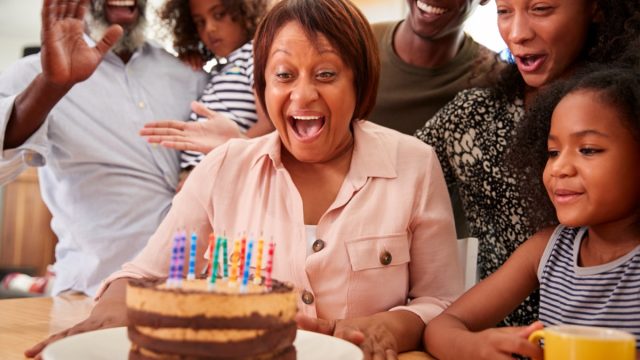
When it comes to getting older, my grandfather used to say “it beats the alternative.” And while it’s true that blowing out yet another candle on your birthday cake is indeed a privilege, that doesn’t mean aging is a walk in the park. As most women turning the big 5-0 can tell you, things start to get a little funky, health-wise, long before that milestone birthday. Perimenopause can begin as early as your mid-30s, and brings plenty of strange symptoms along with it. Once you turn 50, however, there’s no denying the reality of the aging process. Yet doctors say many women are unaware of certain things that happen to us all after that half-century mark.
“Taking a personal, proactive approach—’owning your health’–will help women feel better, live healthier, and enjoy greater control over their lives,” Yale-trained precision medicine physician Florence Comite, MD, founder of the Comite Center for Precision Medicine & Health, tells Best Life.
Eric Tam, MD, a physician at Mighty Health, agrees. “I often remind my patients entering their 50s that it can be an extremely exciting time to reset and reevaluate their health because this is the next chapter that can really help you age gracefully,” he says. Read on for seven things Comite, Tam, and other doctors say women aren’t told about turning 50—and what we can do to keep on thriving in the second half of our lives.
READ THIS NEXT: If You’re Over 50, Sleeping With This Item Can Prevent Night Sweats.
1
Your bones start to break down.

“After age 50, bone breakdown outpaces bone formation, and bone thins. These changes put many women at risk of osteopenia (thin bones) and osteoporosis (porous bones),” Comite says. She warns that women in their 50s are susceptible to wrist fractures (called Colles fractures), spine, and hip fractures—which affect 25 percent of women as they age.
What helps keep our bones strong? “I try to get my patients to engage in exercise,” says Meredith Warner, MD, a board-certified orthopedic surgeon and the founder of Well Theory. “My clinic and physical therapists have developed fast and effective methods to improve strength for older women, and this is the ultimate tool for both bone and brain health.”
2
You should be lifting weights.
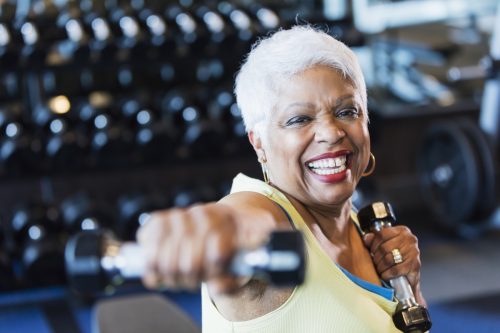
You may think of weight-training as a young person’s game, but in fact, because our bones breakdown, it’s vital for women over 50 to pump some iron.
“Women entering their 50s may experience changes to their bone density, largely due to menopause, so it can be helpful to prioritize resistance training to help maintain bone strength,” says Eric Tam, MD, a physician at Mighty Health. (Resistance training is another term for strength training, or weight training.)
Comite concurs, adding that lifting weights can also help prevent diabetes, cardiovascular diseases such as heart attack and stroke, and Alzheimer’s disease. It also helps us maintain muscle mass and keeps our metabolism ticking along, she says.
READ THIS NEXT: If You’re Between 50 and 80, You Should Be Doing This Daily, Doctors Say.
3
You need to be mindful of your heart health.

Bradley Serwer, MD, Chief Medical Officer at CardioSolution, tells Best Life that heart health should be top of mind for women 50 and older. “Heart disease is the leading cause of death for women in the United States,” he says. Yet because women experiencing heart attacks don’t always have classic symptoms such as chest pain and shortness of breath, they may not realize what’s happening.
“Unfortunately, women are more likely to experience an atypical presentation which may include neck or arm pain instead of chest discomfort. This may lead to a delay in diagnosis,” he explains. “I highly encourage women over the age of 50 to sit down with their medical providers and discuss their individual cardiac risk. I recommend a heart healthy diet in combination with 150 minutes of aerobic exercise per week, and I place a large emphasis on stress reduction.”
4
Empty nest syndrome is a real thing.

Many women in their 50s are transitioning from the day-to-day routine of caring for children and teenagers to the next phase of parenting: Having adult children who live apart from them. “One of the things that doctors should really be talking about more with women in their 50s is the concept of empty nest syndrome, as many parents suffer from grief, depression, and anxiety when their children move out of the home,” says Tam.
He notes that it’s important to reach out to friends and keep ourselves busy when our nests are empty. “As a physician, one of the most important things I recommend to my patients entering their 50s is reprioritizing their mental health and reinvesting in their social networks and hobbies, as studies have shown the negative effects of social isolation and loneliness.”
5
Your hormones can become unpredictable.
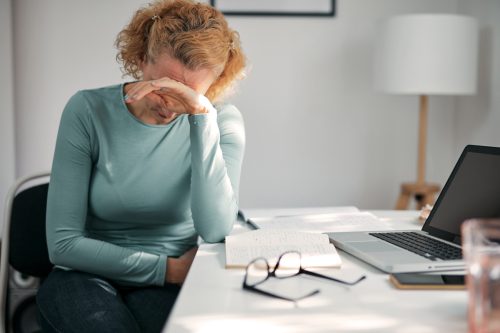
It’s not just during puberty that our hormones go wild—it happens as we come to the end of our reproductive years as well. “During the peak reproductive years, [our hormones] generally rise and fall at a mostly predictable and tolerable monthly cycle,” Comite explains. “In perimenopause and menopause, that regular hormonal schedule is not happening.”
This often results in disrupted sleep patterns, moodiness, anxiety, and depression, she says. And if you’re already prone to depression, these hormonal changes may hit you even harder. “It’s worth noting that women who tend to become depressed during any major life change are typically more prone to depression during perimenopause and menopause,” Comite advises.
For more health news sent directly to your inbox, sign up for our daily newsletter.
6
You might pee when you laugh.
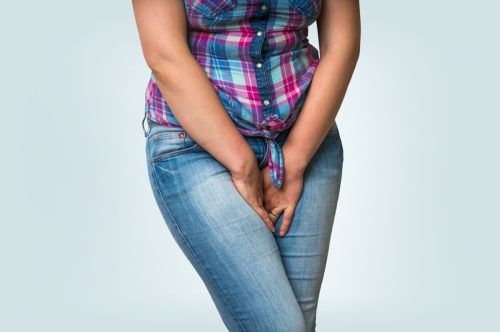
If you’ve given birth, you may already be familiar with what can happen when you sneeze, laugh, or jump on a trampoline—but after age 50, it may become a regular occurrence, says Comite. “We’ve all squirted a bit of urine while laughing, coughing, sneezing, but that little accident may become more frequent after age 50 because childbirth, hysterectomies, and menopause can cause the muscles of the pelvic floor to become weaker and allow the pelvic organs to shift a bit out of place,” she explains.
Kegel exercises can help, however. Comite recommends tensing the muscles you use to stop peeing, squeezing and holding for 10 to 15 seconds, then relaxing. “Do these five to 10 times a day. You can even do them while standing in a grocery line. No one will be wiser!”
7
Your skin gets thinner.
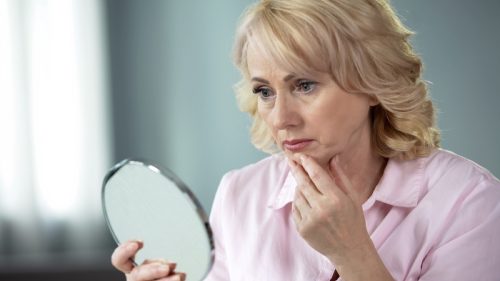
Once we’ve weathered a half century’s worth of life’s disappointments, insults, and indignities, we tend to develop a pretty tough shell. However, that thick skin is only metaphorical. Our actual epidermis is doing the opposite: it’s getting thinner.
“Around age 50, changes in the collagen fibers in the deep layers of your skin cause your skin to become thinner and less elastic,” says Comite, noting that this results in the fine lines and wrinkles many of us dread. “Our skin also produces less moisturizing natural oils, which results in drier skin and even more wrinkles,” she says. “Eating a healthful diet, both macro and micronutrients, and proper hydration will help your skin retain its suppleness and healthy appearance.”
And don’t skip the sunscreen, either! “Sun damage is an ongoing process; continue to use protective sunscreen and monitor your sun exposure to reduce the risk of skin cancers, such as basal and squamous cell cancer,” Comite urges.
Best Life offers the most up-to-date information from top experts, new research, and health agencies, but our content is not meant to be a substitute for professional guidance. If you have health questions or concerns, always consult your healthcare provider directly.